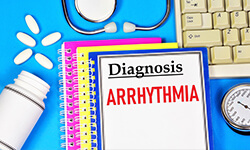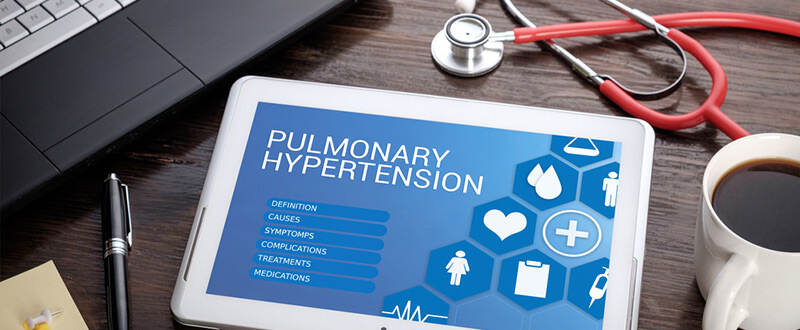What Is Pulmonary Hypertension?
Pulmonary hypertension, also known as PH or PHTN, is one of the types of high blood pressure in which the blood pressure is higher than usual in the arteries present in your lungs and heart.
In Pulmonary High Blood Pressure, termed as pulmonary arterial hypertension, your pulmonary (lungs) blood vessels become narrow and constricted or clogged/damaged. Due to this condition, the blood circulation through the lungs slows down while increasing the blood pressure in the arteries of the lungs. As a result, it becomes quite difficult for your heart to pump the blood. It eventually leads to the weakening and failure of your heart muscles.
What Are The Symptoms Of Pulmonary Hypertension?
As far as the signs and symptoms of high pulmonary pressures are concerned, in most cases, these develop gradually and can go unnoticed for years. With the progression of the disease, the symptoms might get worse. Here are the typical telltale signs of pulmonary high blood pressure
What Are The Causes Of Pulmonary Hypertension?
Here are some of the main causes of pulmonary hypertension:
What Are The Risk Factors For Pulmonary Hypertension?
Following factors can increase your risk of developing pulmonary high blood pressure.
What Are The Complications Of Pulmonary Hypertension?
The health complications that can arise due to pulmonary hypertension include the following:
-
Enlargement Of The Heart (right-sided) And Heart Failure:
 In this condition, the right ventricle of your heart enlarges and needs to work harder to circulate blood through the clogged arteries of the lungs. Initially, the walls of your heart become thick to compensate and expand the right ventricle’s chamber to increase the blood-holding capacity. However, it eventually puts more strain on your heart leading to heart failure.
In this condition, the right ventricle of your heart enlarges and needs to work harder to circulate blood through the clogged arteries of the lungs. Initially, the walls of your heart become thick to compensate and expand the right ventricle’s chamber to increase the blood-holding capacity. However, it eventually puts more strain on your heart leading to heart failure. -
Formation Of Blood Clots:
 You are more likely to develop blood clots in your lungs’ small arteries due to pulmonary hypertension. It can be quite dangerous if your blood vessels are already blocked or have become narrow.
You are more likely to develop blood clots in your lungs’ small arteries due to pulmonary hypertension. It can be quite dangerous if your blood vessels are already blocked or have become narrow. -
Arrhythmia:
 PH can lead to arrhythmias or irregular heartbeats, followed by episodes of fainting and dizziness. In some cases, arrhythmia can be severe and even life-threatening.
PH can lead to arrhythmias or irregular heartbeats, followed by episodes of fainting and dizziness. In some cases, arrhythmia can be severe and even life-threatening. -
Complications With Pregnancy:
 PH can be risky for the mother as well as her baby.
PH can be risky for the mother as well as her baby.
Conclusion
In many cases, Pulmonary Hypertension can get worse and life-threatening with time. Therefore, medical intervention is a must. Although some types of pulmonary high blood pressure are not entirely curable, on-time treatment can help to relieve the symptoms while improving your quality of life. Therefore, you should check with your doctor from time to time and follow the instructions.
Note of Caution: This article is for information purpose only. Always consult your doctor in case of any blood pressure or other health-related problems.
Disclaimer
The information contained in this article is to educate, spread awareness in relation to hypertension and other diseases to the public at large. The contents of this article are created and developed by BPinControl.in through its authors, which has necessary, authorisations, license, approvals, permits etc to allow usage of this articles on The Website. The views and opinions expressed in this article are views, opinions of the respective authors and are independently endorsed by doctors. Although great care has been taken in compiling and checking the information in this article, The Website shall not be responsible, or in any way liable for any errors, omissions or inaccuracies in this article whether arising from negligence or otherwise, or for any consequences arising therefrom. The content of this article is not a substitute for any medical advice. The Website shall not be held responsible or liable for any consequence arising out of reliance on the information provided in the article.

 Shortness of breath while exercising (and even at rest with the progression of the condition)
Shortness of breath while exercising (and even at rest with the progression of the condition) Dizziness and fatigue
Dizziness and fatigue Pain in chest
Pain in chest A feeling of pressure in the chest
A feeling of pressure in the chest Bluish colouration of lips
Bluish colouration of lips Swelling in legs and ankles
Swelling in legs and ankles Heart palpitations
Heart palpitations Formation of Blood Clots in the lungs
Formation of Blood Clots in the lungs HIV Infection
HIV Infection Substance Abuse
Substance Abuse Congestive Heart Failure
Congestive Heart Failure Liver Cirrhosis
Liver Cirrhosis Congenital Heart Defect
Congenital Heart Defect Chronic Bronchitis
Chronic Bronchitis Pulmonary Fibrosis
Pulmonary Fibrosis Autoimmune Diseases, like Scleroderma, Lupus, and Rheumatoid Arthritis
Autoimmune Diseases, like Scleroderma, Lupus, and Rheumatoid Arthritis Sleep Apnea
Sleep Apnea Ageing
Ageing Family medical history of PH
Family medical history of PH Being obese or overweight
Being obese or overweight Blot-clot conditions
Blot-clot conditions Substance abuse
Substance abuse Certain genetic deformities
Certain genetic deformities Asbestos exposure
Asbestos exposure Taking certain antidepressants
Taking certain antidepressants Taking certain drugs for weight loss
Taking certain drugs for weight loss


